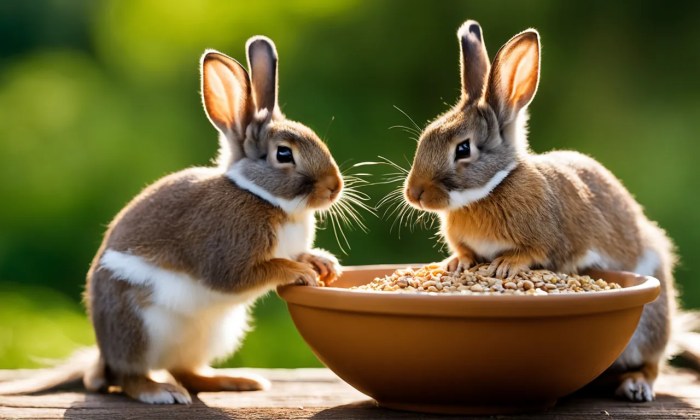Rabbits, those adorable and fluffy creatures, have captivated our hearts with their endearing nature. As responsible pet owners, understanding their dietary needs is paramount. One common question that arises is whether rabbits can indulge in bird seed. In this article, we delve into this topic, exploring the nutritional value of bird seed, potential health risks, and healthier alternatives for your furry friend.
Rabbits, being herbivores, primarily consume plants. Bird seed, a staple food for feathered friends, is not a natural part of a rabbit’s diet. However, it’s essential to understand the implications of offering bird seed to your rabbit.
Introduction
Rabbits are herbivores, meaning their diet consists primarily of plants. They typically eat grasses, hay, vegetables, and fruits.
Bird seed, on the other hand, is a common food source for birds. It is typically made from a variety of grains, such as millet, milo, and sunflower seeds.
Nutritional Value of Bird Seed
Bird seed and rabbit pellets have distinct nutritional profiles that impact rabbits’ health differently. The following table compares the nutritional content of these two food sources:
| Nutrient | Bird Seed | Rabbit Pellets |
|---|---|---|
| Protein | 10-15% | 16-18% |
| Fiber | 2-5% | 18-20% |
| Fat | 15-20% | 2-4% |
As evident from the table, bird seed is higher in fat and lower in fiber compared to rabbit pellets. These differences can have detrimental effects on rabbits’ health.
High Fat Content
The high fat content in bird seed can lead to obesity, cardiovascular issues, and digestive problems in rabbits. Rabbits have a delicate digestive system that is adapted to process a diet high in fiber and low in fat. The excessive fat in bird seed can disrupt their digestive balance, causing diarrhea and other health issues.
Low Fiber Content
Fiber is essential for maintaining a healthy digestive system in rabbits. It helps regulate bowel movements, prevent digestive blockages, and support overall gut health. The low fiber content in bird seed can lead to constipation, impaction, and other digestive problems in rabbits.
Therefore, it is crucial to avoid feeding bird seed to rabbits as their primary diet. Rabbits require a balanced diet specifically formulated for their nutritional needs, which includes a higher proportion of fiber and a lower proportion of fat than bird seed.
Potential Health Risks
Rabbits are herbivores and their digestive systems are not equipped to handle the high fat and protein content of bird seed. Consuming bird seed can lead to a number of health problems, including:
Digestive Issues
Bird seed is difficult for rabbits to digest, and can cause diarrhea, bloating, and gas. These digestive issues can be painful and can lead to dehydration and malnutrition.
Obesity and Heart Disease
Bird seed is high in fat and calories, and can lead to obesity and heart disease in rabbits. Obese rabbits are more likely to develop other health problems, such as arthritis, respiratory problems, and skin infections.
Harmful Bacteria and Parasites
Bird seed can also contain harmful bacteria and parasites, which can cause illness in rabbits. These bacteria and parasites can cause a variety of symptoms, including diarrhea, vomiting, and respiratory problems.
Alternatives to Bird Seed

While bird seed may not be an ideal food source for rabbits, there are plenty of healthy and nutritious alternatives that can provide them with the nutrients they need. A balanced diet that meets their nutritional requirements is essential for their overall health and well-being.
Hay
Hay is an essential component of a rabbit’s diet and should make up the majority of their food intake. It provides them with fiber, which is important for their digestive health. Hay also helps to wear down their teeth, which continue to grow throughout their lives.
Fresh Vegetables
Fresh vegetables are another important part of a rabbit’s diet. They provide essential vitamins, minerals, and antioxidants. Some good options include leafy greens such as romaine lettuce, kale, and spinach, as well as carrots, celery, and bell peppers.
Rabbit Pellets
Rabbit pellets are a convenient way to provide your rabbit with a balanced diet. They are typically made from hay, grains, and other nutritious ingredients. However, it is important to choose high-quality pellets that are specifically designed for rabbits.
Last Point
In conclusion, while rabbits may nibble on bird seed out of curiosity, it should not be considered a regular part of their diet. The nutritional deficiencies and potential health risks associated with bird seed outweigh any perceived benefits. By providing a balanced and species-appropriate diet, you can ensure your rabbit’s well-being and longevity.
Questions and Answers
Can rabbits eat bird seed in small amounts?
While rabbits may occasionally nibble on bird seed, it should not be offered regularly. The high fat and low fiber content can cause digestive issues and other health problems.
What are healthy alternatives to bird seed for rabbits?
Hay, fresh vegetables, and rabbit pellets are excellent and nutritious choices for rabbits. These foods provide the essential nutrients rabbits need to stay healthy.
Can rabbits get sick from eating bird seed?
Yes, rabbits can experience digestive issues, obesity, heart disease, and other health problems if they consume bird seed regularly. Bird seed can also contain harmful bacteria and parasites.